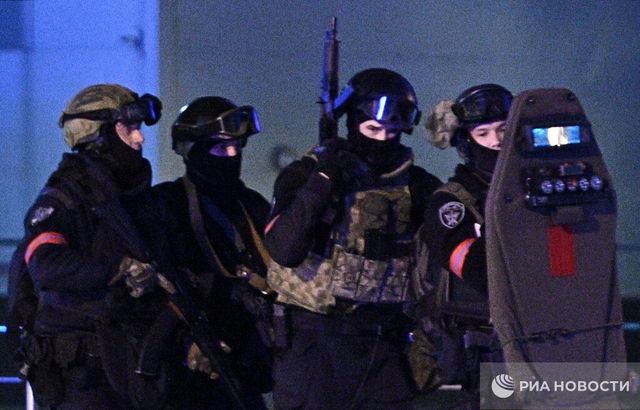The death toll from the devastating attack on a concert hall near Moscow has risen to 133, as Russian authorities arrested 11 people, including four suspected gunmen, in connection with the deadliest attack in Russia for 20 years. The Islamic State's Afghan branch, known as ISIS-K, claimed responsibility for the attack, with the U.S. confirming the authenticity of the claim.
State TV editor Margarita Simonyan earlier gave a toll of 143, according to Reuters.
The attack unfolded on Friday evening at the Crocus City Hall, where camouflage-clad gunmen opened fire with automatic weapons and threw explosive devices at concertgoers before a performance by a Soviet-era rock band. The ensuing fire caused the roof to collapse, trapping many inside. State TV editor Margarita Simonyan reported that 28 bodies were found in a toilet and 14 on a staircase, with "many mothers found embracing their children."
According to the FSB security service, the four arrested "terrorists" were heading towards the Ukrainian border when they were apprehended. Foreign Ministry spokeswoman Maria Zakharova said, "Now we know in which country these bloody bastards planned to hide from pursuit - Ukraine." Despite these claims, Ukrainian presidential adviser Mykhailo Podolyak denied any involvement, stating, "Ukraine had absolutely nothing to do with these events."
The attack has brought attention to ISIS-K, one of the most active affiliates of the Islamic State. The group, which emerged from eastern Afghanistan in late 2014, has established a fearsome reputation for acts of brutality. "I think their ideology inspires them in terms of selecting targets. First of all, Russia is in Syria and fighting against Daesh [ISIL] like the United States. That means they see such countries as hostile," said Murat Aslan, a military analyst and former Turkish army colonel.
ISIS-K has claimed responsibility for several high-profile attacks in recent years, including the 2021 attacks outside Kabul airport that killed at least 175 civilians and 13 U.S. soldiers, as well as attacks on a maternity ward in Kabul and Kabul University in 2020. The group has also targeted Iran, claiming responsibility for attacks on a major shrine in Shiraz and coordinated suicide bombings in Kerman.
Experts say that Russia is seen as a key opponent of ISIL, with Moscow becoming a focus of ISIS-K's extensive propaganda war. "Russia's engagement in the global fight against ISIS and its affiliates, especially through its military operations in Syria and its efforts to establish connections with the Afghan Taliban - ISIS-K's rival - marks Russia as a key adversary for ISIS/ISIS-K," said Amira Jadoon, assistant professor at Clemson University and co-author of "The Islamic State in Afghanistan and Pakistan: Strategic Alliances and Rivalries."
The attack has prompted increased security measures across Russia, with all large-scale public events cancelled nationwide. The United Nations Security Council condemned the "heinous and cowardly terrorist attack," while world leaders expressed shock and sent their condolences.
As investigations continue, the Moscow concert hall attack serves as a stark reminder of the ongoing threat posed by ISIS-K and its expanding global reach. The rivalry between Russia and the Islamic State, as well as the group's ambition to evolve into a formidable regional entity, underscores the need for continued vigilance and counterterrorism efforts in the face of an ever-evolving threat landscape.
This article has been updated with the latest information.






